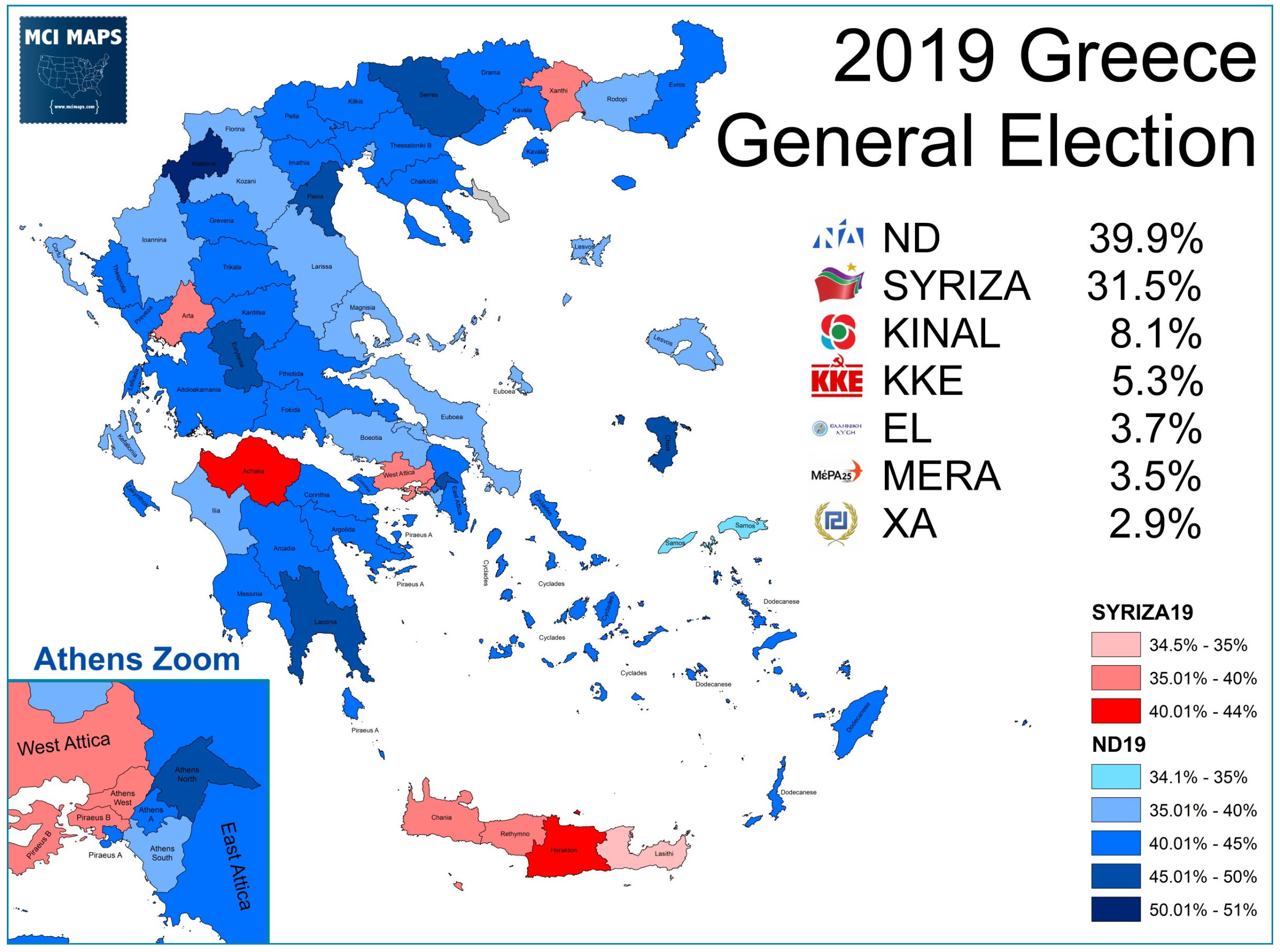Just a few weeks ago, Greece held elections for its parliament. The results were what polls predicted, a loss for the ruling SYRIZA party and a return of New Democracy (ND) to power. Despite Greece being on the recovery from its economic crisis, the economy is still fragile; and voters still feel the hurt of austerity. However, this article isn’t just about that election, its about how Greece’s economic crisis and subsequent bailouts completely upended the Greek Party structure.
Greece’s Party Dynamics
The 1967 Coup and Collapse of the Monarchy
Modern Greek politics began in 1974, with the fall of the Military Junta that ruled the county from 1967-1974. The dictatorship, led by right-wing Colonels, was orchestrated to prevent a left-wing government from emerging in the upcoming elections. The move came two years after King Constantine II had dismissed the left-wing Prime Minister, Georgious Papandreaou, and tried to appoint a new prime minister to form a government. These efforts failed and the 1967 it was believe Papandreaou’s Center Union Party would win the most seats and probably unite with the UDL to form a government. Many in the army believed the UDL to be a front for the Communist Party; which was banned in Greece.
Subsequently, the King and Generals in the army discussed a possible coup if a left-wing victory emerged in the election. However, two weeks before the elections, a group of right-wing colonel’s staged their own coup and King Constantine swore them in as the legitimate government. They ruled until 1974. The cause of their fall is long and complicated, but the nail in the coffin was the invasion of Cyprus by Turkey – a move that caused many in the army to lose support for the military leadership and weakened the Junta enough to force a unity government and scheduling of new elections.
The November 1974 elections saw the right-of-center New Democracy Party win power. A month later the country held a referendum on whether to abolish the monarchy and become a full Republican. King Constantine claimed he only supported the Junta out of intimidation (indeed the coup was not carried out by the same people he had been talking with). However, the clashes between Constantine and Papandreaou, and the belief he the King didn’t respect Democratic institutions, made the referendum a landslide. Constantine wasn’t allowed back into Greece until 1981, and even then just for a few hours for his mothers funeral.
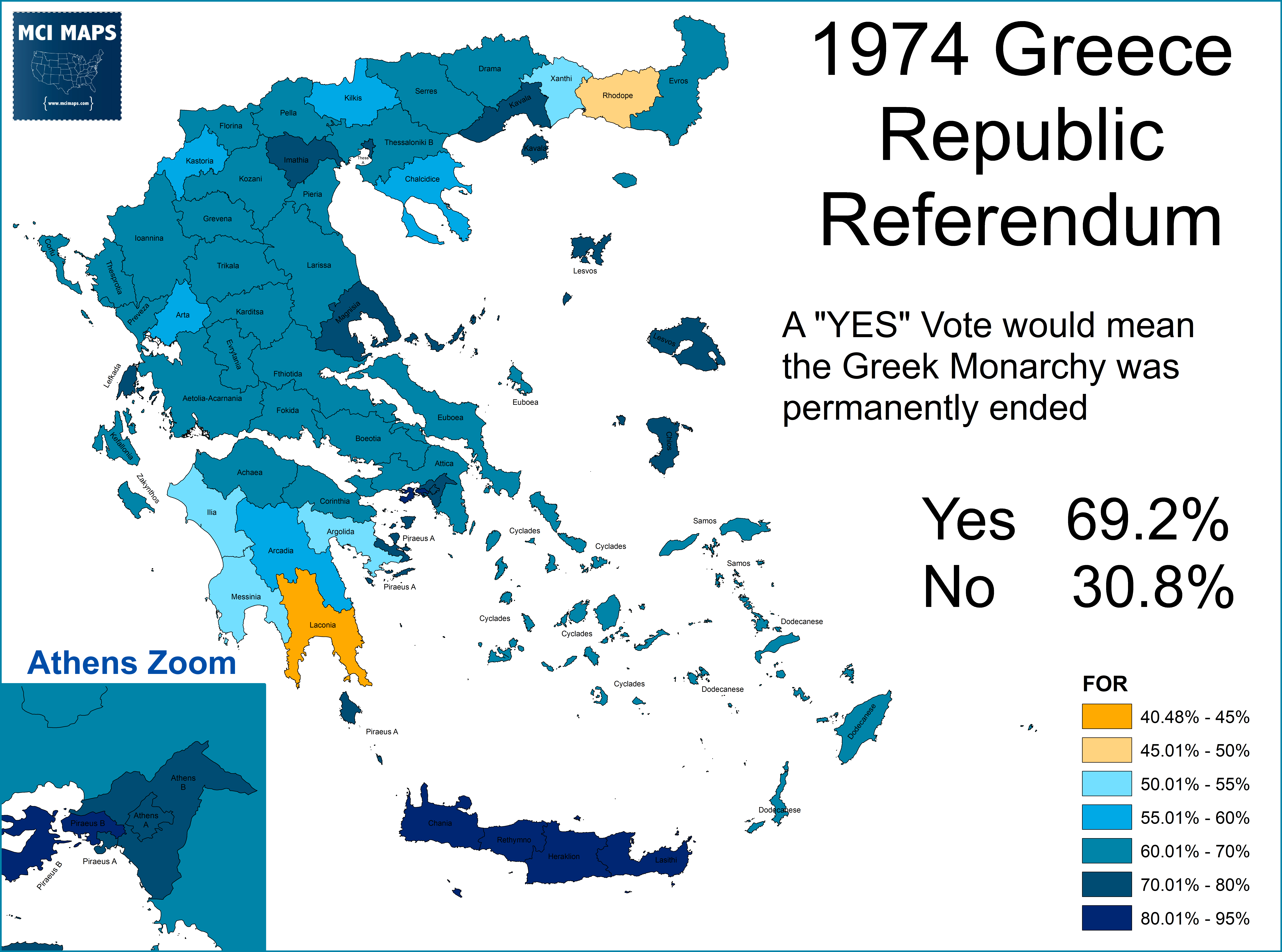
The time post this referendum is known as the Third Hellenic Republic.
The Era of the ND and PASOK Parties
By 1977’s elections, clear party positions began to take hold. New Democracy became the center-right party while PASOK formed to become the main center-left party. The Community Party, the KKE, was legalized and allowed to participate in elections. These parties remained the three largest, with a PASOK and ND combining to over 80% of the vote for decades. That pattern would hold until 2009.
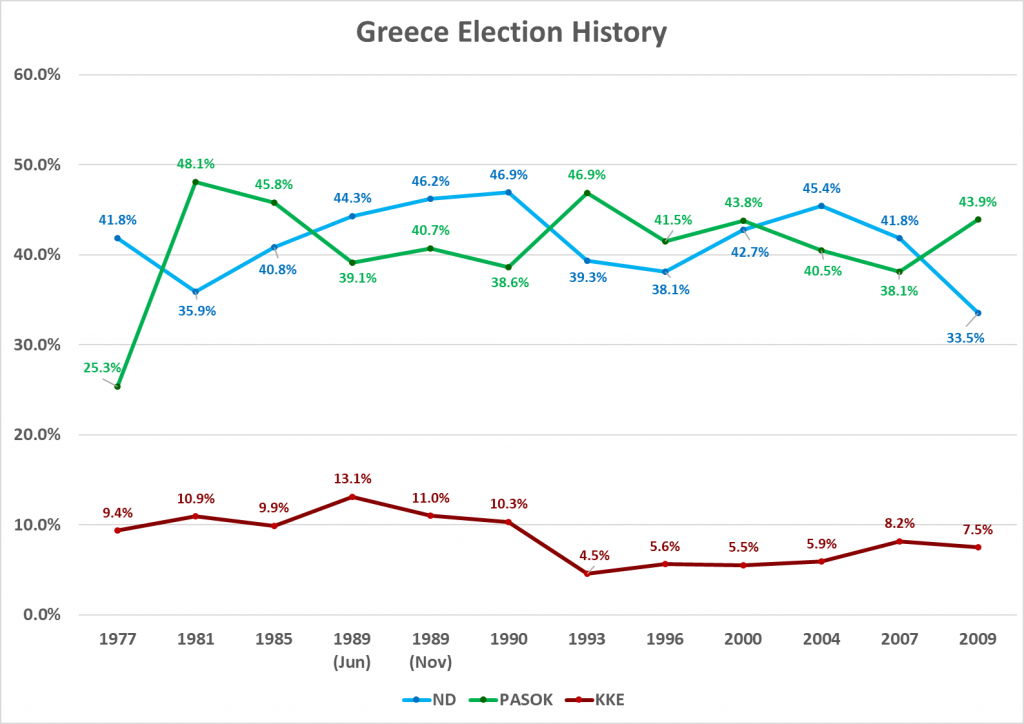
2009 was the last election Greece held under its old party system.
Greece’s Economic Crisis
The Greek economic crisis is pretty complicated. But the simplest version ever is as follows
- Greece lied about its debt-to-GDP numbers for years to get into the Eurozone and keep in good credit with the EU system
- Greece’s weak economy was hurt by being part of the same currency as countries like Germany and France
- The 2008 financial crisis made markets and lenders more nervous about giving out loans, which Greece needed by that point to stay afloat because it was already so much in debt
- The recession also hurt tourism, a major source of income for Greece, further hurting its debt-to-GDP ratio
- By 2009, debt was 13% of Greece’s entire GDP
- Greece’s credit rating began drastic drops, making it harder to get money. Greece also cannot print more money since it is part of the Euro (even though modest printing can help inject money into economy while not increasing inflation too much)
If you want more details, there are countless videos on youtube (use the trusted accounts people) and this timeline wiki is a good source as well.
What is clear is Greece was lying about its financial state for many years. It submitted altered data to get into the Eurozone in 2001. Getting use of the Euro currency would seem like a good thing for Greece, but there is actually a strong argument why its only hurt the country. The country entered the Eurozone under the PASOK-led government; but they lost their control of parliament in 2004.
The ND government that took over revealed problems with the countries accounting, but it had its own scandals and troubles as well. By the early 2000s the country was already experiencing economic struggles and while the county’s hosting of the 2004 Olympics went off without a hitch; the run-up construction went way over budget. ND won re-election in 2007, but the race was very close.
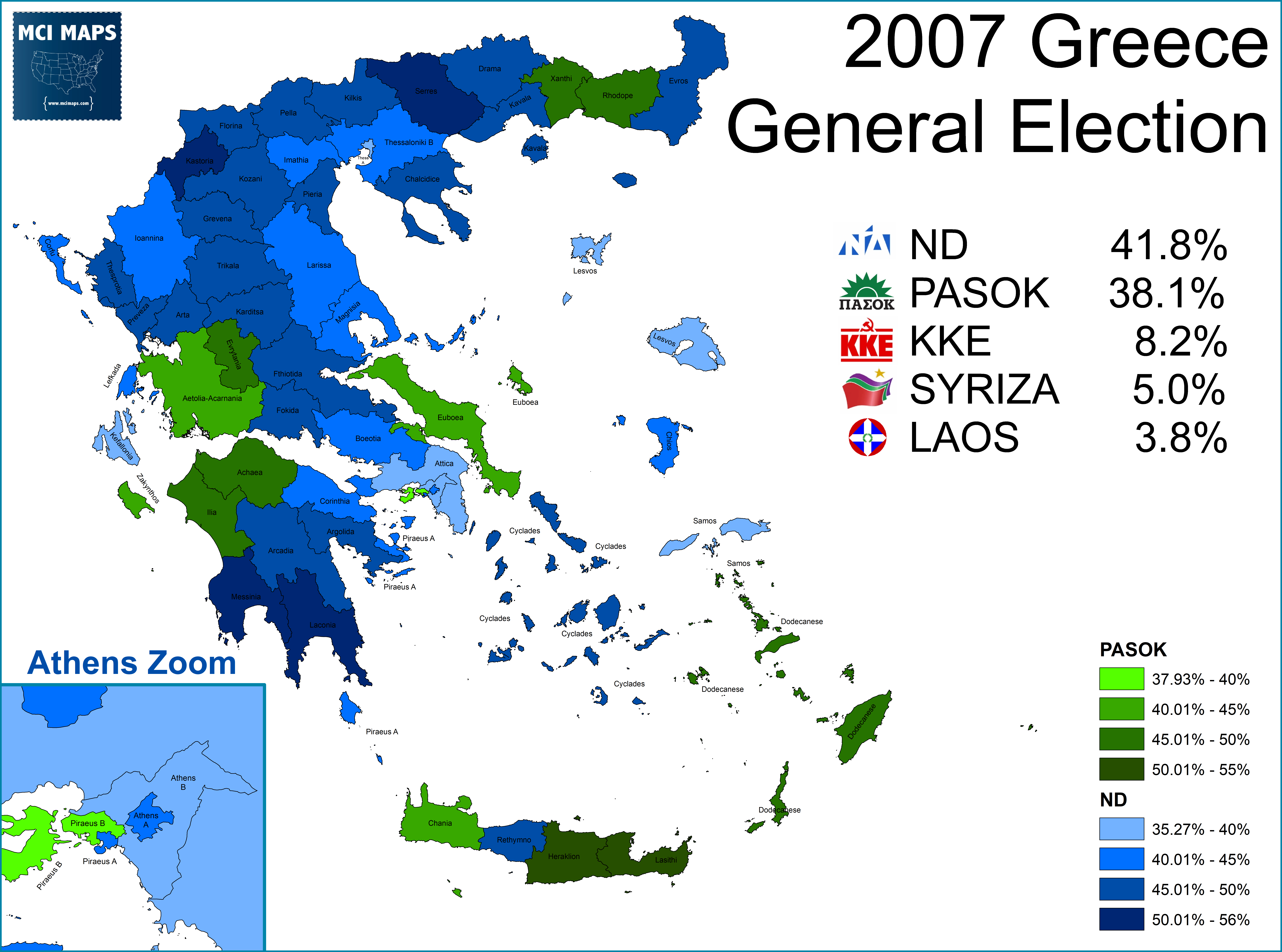
After the elections, the economy continued to sag. The country was rocked by riots in 2008 (caused by the shooting of a 15 year old by a cop) and wildfires that killed many people. EU leaders and financial markets also accused the government of continuing to underestimate its budget deficits. Amid widespread discontent, ND called for new elections, which were easily won by PASOK.
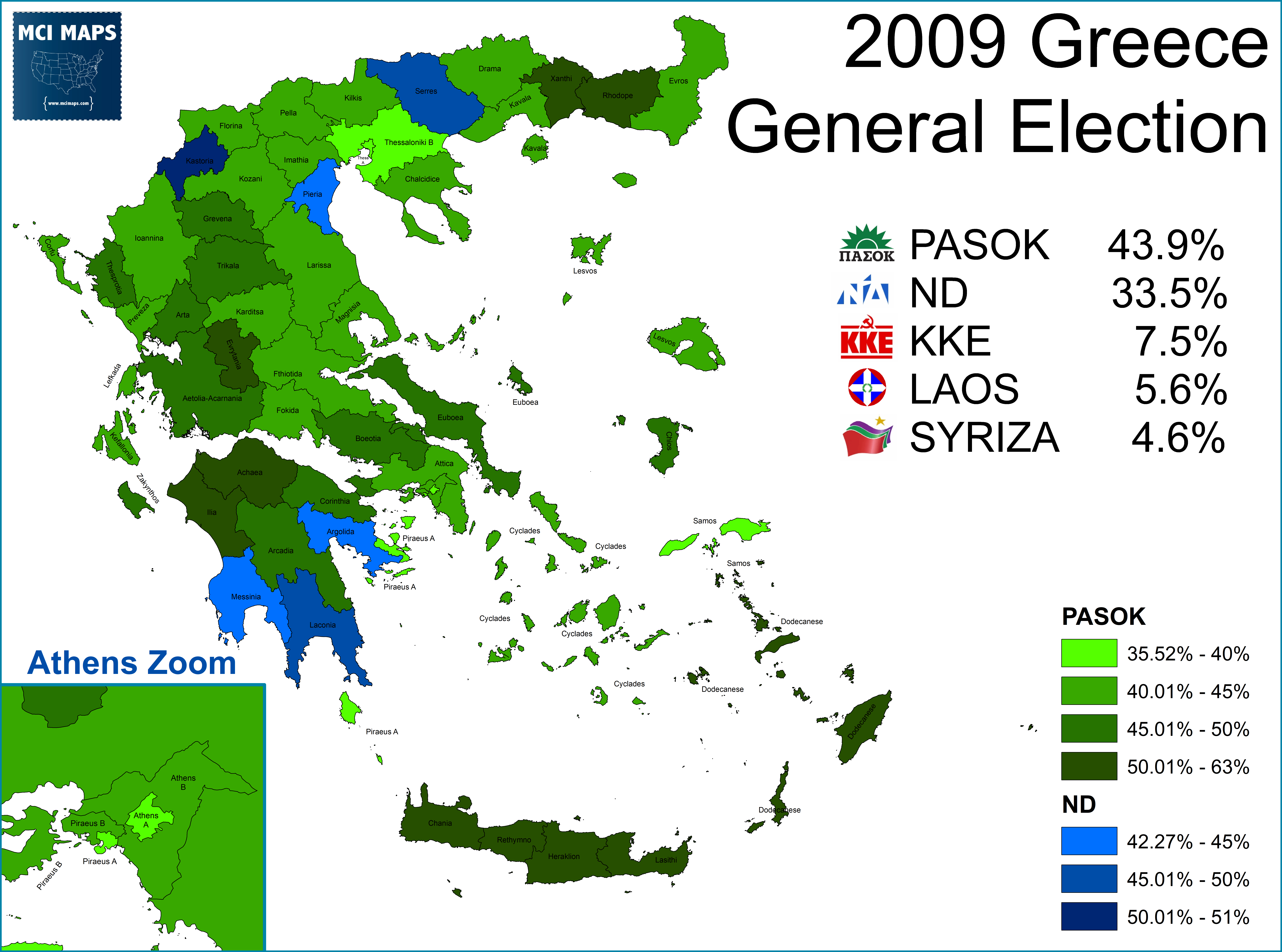
The win for PASOK would wind up being its undoing. The effects of the Great Recession, Greece’s lies about its finances, and Euro itself, all caused Greece to undergo a massive financial and debt crisis. By the time Prime Minster George Papandreou took office, unemployment was already at 10%, and now Greece was reporting a deficit that was 13% of its entire GDP. The country needed money to continue operating and with its bonds collapsing in value, needed a bailout from the EU.
The mandate for bailout money was austerity measures – cuts to services, pensions and raising of taxes – to balance the budget and reign in the debt. These measures are what made the Greek debt crisis a humanitarian crisis in the country – and they sparked massive protests. In 2010, a $100 billion Euro bailout was agreed too, but it came with these unpopular austerity measures. Left-wing voters felt completely betrayed by PASOK and by 2011, 77% of people had no faith in the prime minster.
With the crisis getting worse and the protests mounting, Papandreaou planned to hold a referendum on the terms of the bailout. However, the proposal faced pushback within and outside of Greece, and was scrapped. In November 2011, Papandreaou decided to step aside as Prime Minster so that a national unity government could be formed between PASOK, the ND, and the Popular Orthodox Rally. The new Priminister was Lucas Papademos, a political outsider, to led the country through until the next election. The far-left SYRIZA party and the KKE refused to participate in this national government.
More austerity cuts came in January of 2012, including; cuts to pay, canceling of holiday bonus. changes to the minimum wage, and ending of cost-of-living increases. Meanwhile, cash flow in Greece was so perilous that the Ministry of Finance said it only had a enough money to pay salaries through the end of June. Elections were held in April to elect a new government.
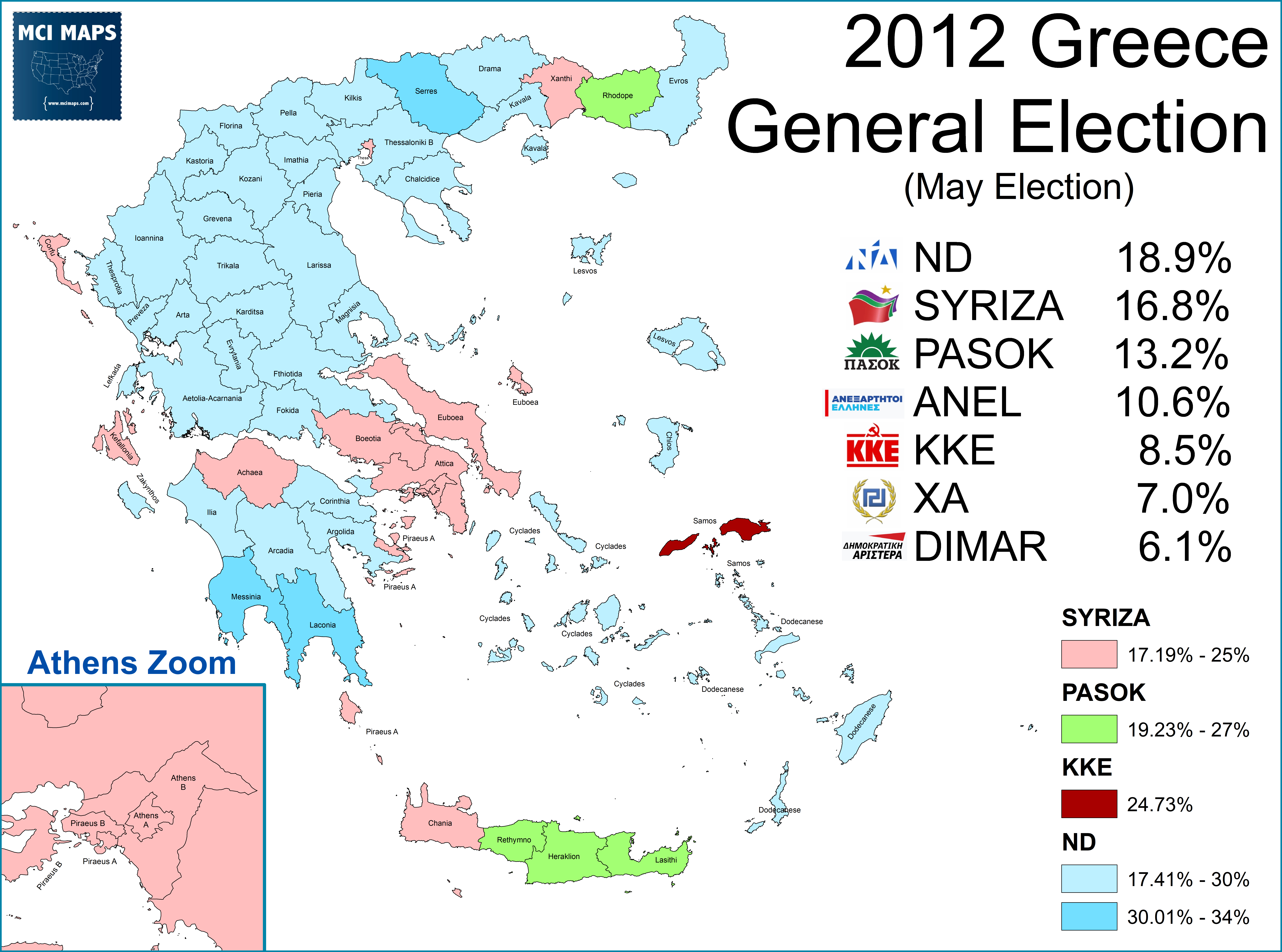
The results were a complete collapse of normal party order. PASOK and ND saw their support completely collapse. Meanwhile, the far-left SYRIZA, which railed against the austerity reforms, surged into 2nd place. In addition, DIMAR, a left-wing party, rose up and snagged 6%. ANEL, a more conservative party that was eurosceptic, also jumped to 10%. Disturbingly, Golden Dawn, a far-right fascist party, jumped to 7% after only getting 0.3% in 2009.
After many negotiations, no working majority could be agreed upon, and another election was ordered.
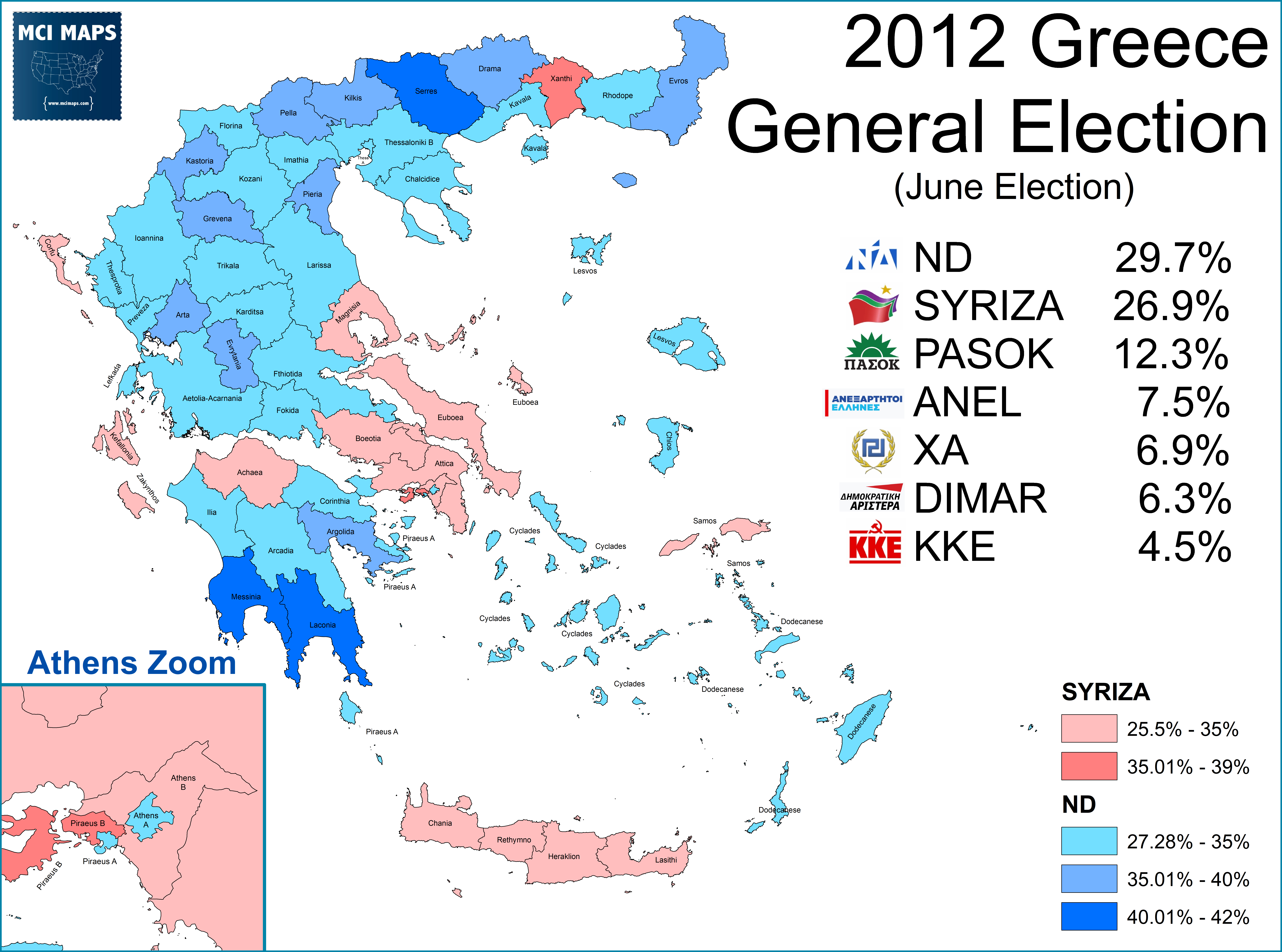
New Democracy was able to consolidate a bit more support in the 2nd round of voting and used its win for form a coalition with PASOK and DIMAR. Fault lines between parties largely came down to pro or anti EU bailout sentiment. SYRIZA specifically said they did not support the conditions put upon Greece for getting bailout money.
The new ND-led government, under Prime Minster Antonis Samaras, struggled to meet austerity needs to continue getting bailout money. Additional measures include firing thousands of civil servants, raising the retirement age, cuts of up to 20% in wages, and cutting off the public broadcasting system. The country needed bailout money to keep cash flowing through the economy, but its austerity measures were constricting growth and spiking unemployment. The left-leaning DIMAR eventually left the government.
After years of turmoil, snap elections were called for January of 2015. The results were a resounding win for SYRIZA, which campaigned against the conditions of the bailout and on an anti-austerity platform.
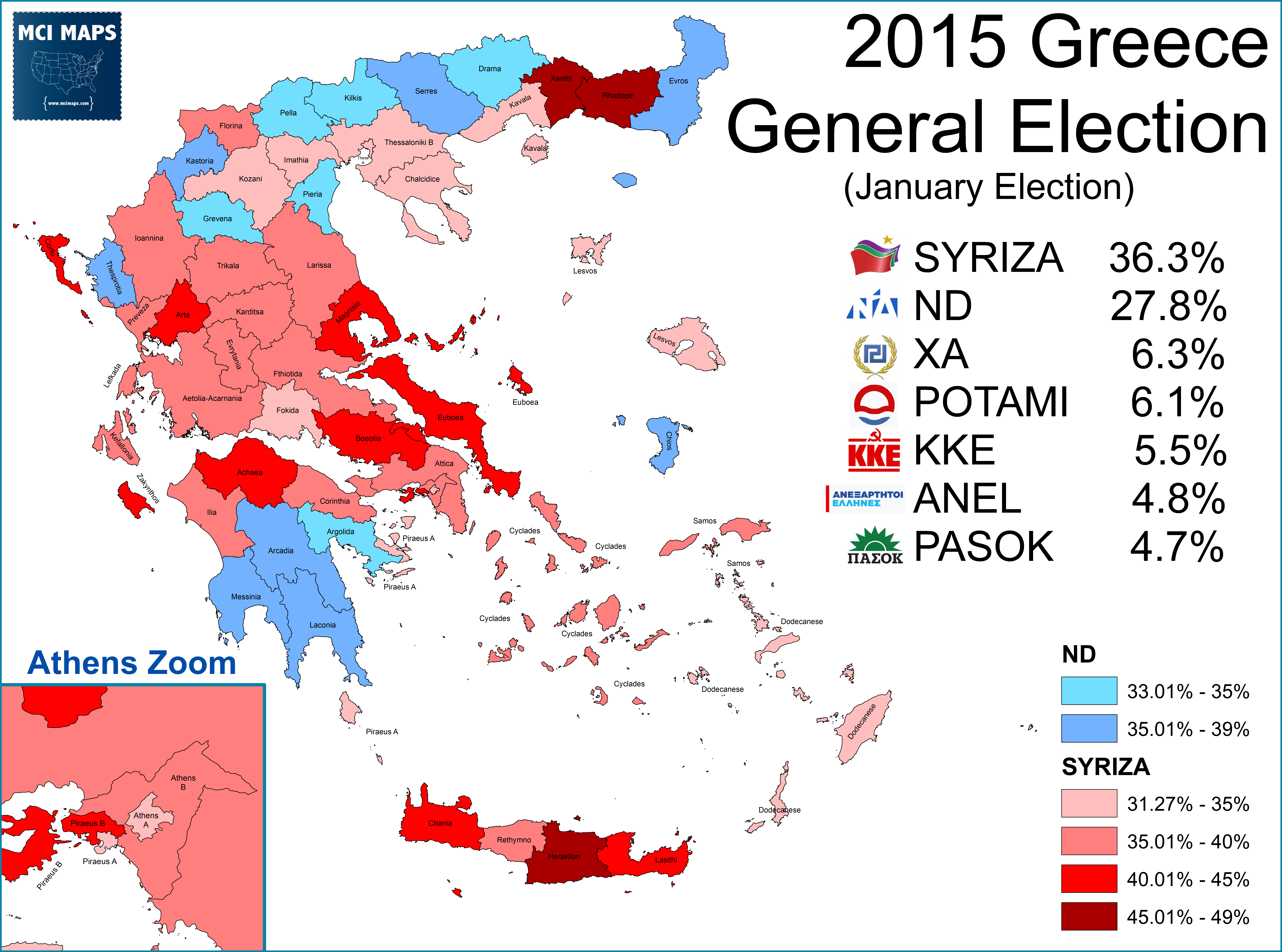
Minister Tsipras became Prime Minister while he and ANEL (a conservative eurosceptic party) formed a coalition. For many European leaders, this result was scary. Tsipras campaigned on a promise to push back on the EU’s demands of austerity in exchange for bailout funds. His elections represents an uncertainty in a very volatile time.
SYRIZA Transformation
Greece’s financial situation during this entire time was so dire that without bailout money, the possibility of ATMs not having cash was very real. While the government planned to rework its deal with the EU, a four-month loan was approved just to keep the country afloat in the meantime.
After the EU insisted on continued austerity for more bailout funds, Tsipras said he would put the deal to a vote of the Greek people. He also said he would resign if YES won, saying he would not implement more austerity. Not only did the bailout proposal fail, but it did even worse than the combined anti-austerity party votes from that year’s legislative elections.
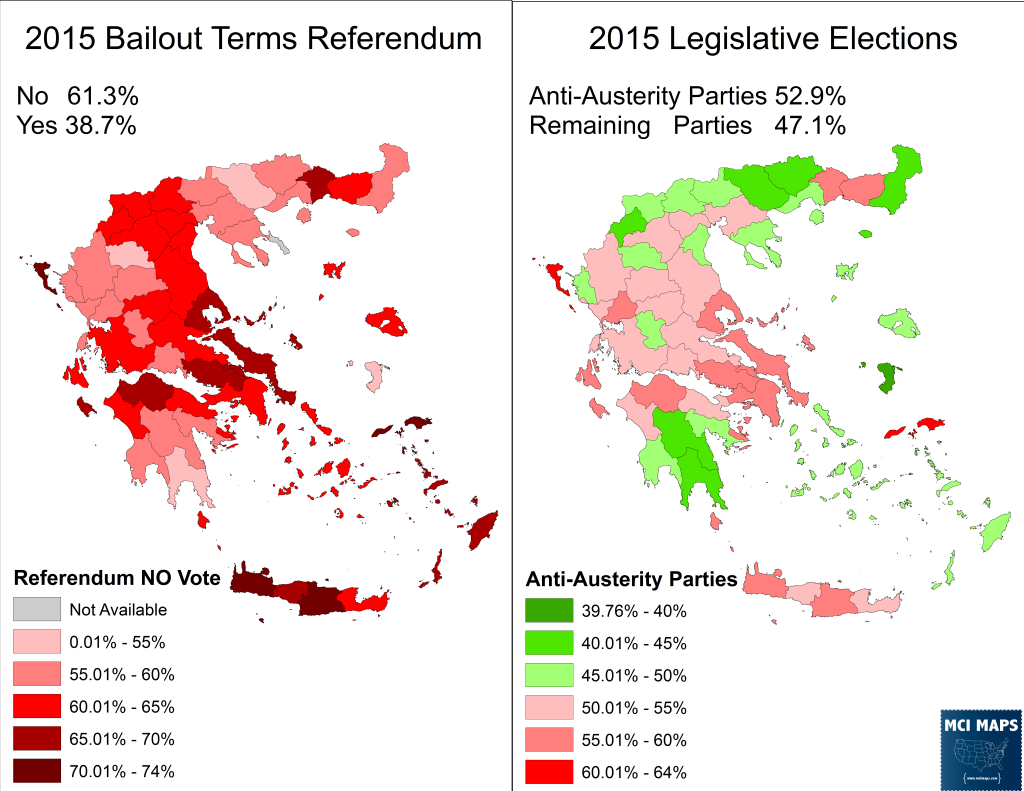
The situation in Greece was very dire. Banks had to be closed and ATM withdraws were limited to 60 euros a day. At the end of June, Greece became the first developed nation to miss an IMF payment on its debt. With the EU unwilling to budge, and worries that cash would dry up any day, Tsispras backed down and agreed to more austerity measures in exchange for a three year bailout program.
Following the passage, Tsipras resigned and pledged to run in a snap election, saying the people should render a verdict on if he’d remain Prime Minster. He was frank that the developments had not been what he’d hoped for. The September elections saw his party retain control, with results close to what the had been in January.
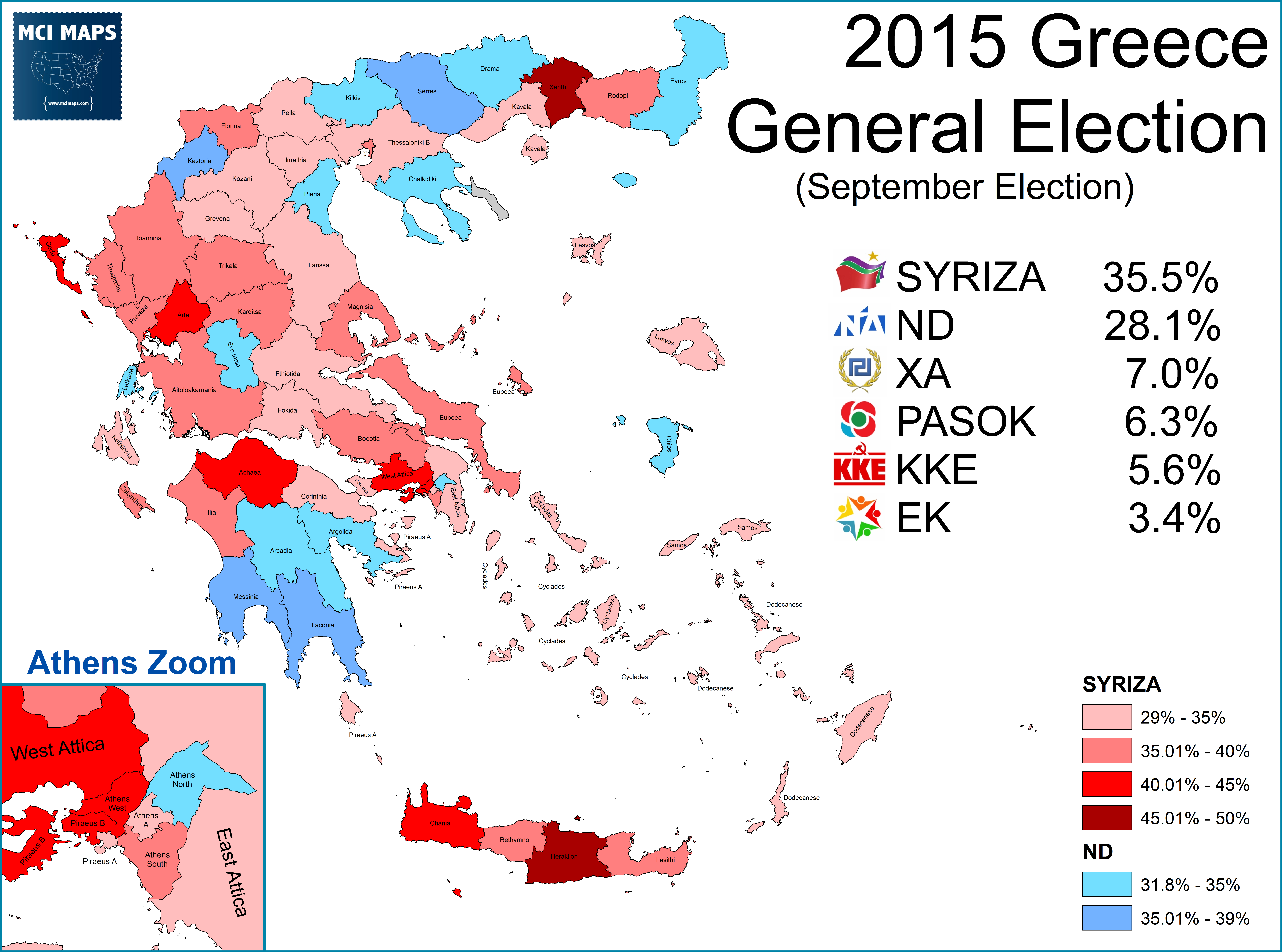
After the election, Tsipras’s government continued to guide the country through the rough economic times. The country did find stable footing and got its debt eliminated. The country exited its bailouts in 2018. However, the economic pain of austerity still remains in the country and its economy is still shaky.
Depending on who you ask, Tsipras is either someone who surged into power and made tough but needed decisions to avert disaster; or he sold out his convictions and betrayed his values.
The 2019 Election
The 2019 election was the first time in a decade that Greece has held a vote not under the pressure of bailouts and crisis. However, years of austerity pain and continued economic sluggishness (albeit in the right direction) resulted in the SYRIZA Party looking weak in the polls. It was expected that New Democracy would likely win the election; though many predicted that Tsipras would continue to be a force in the nation’s politics. The results were a solid ND victory.
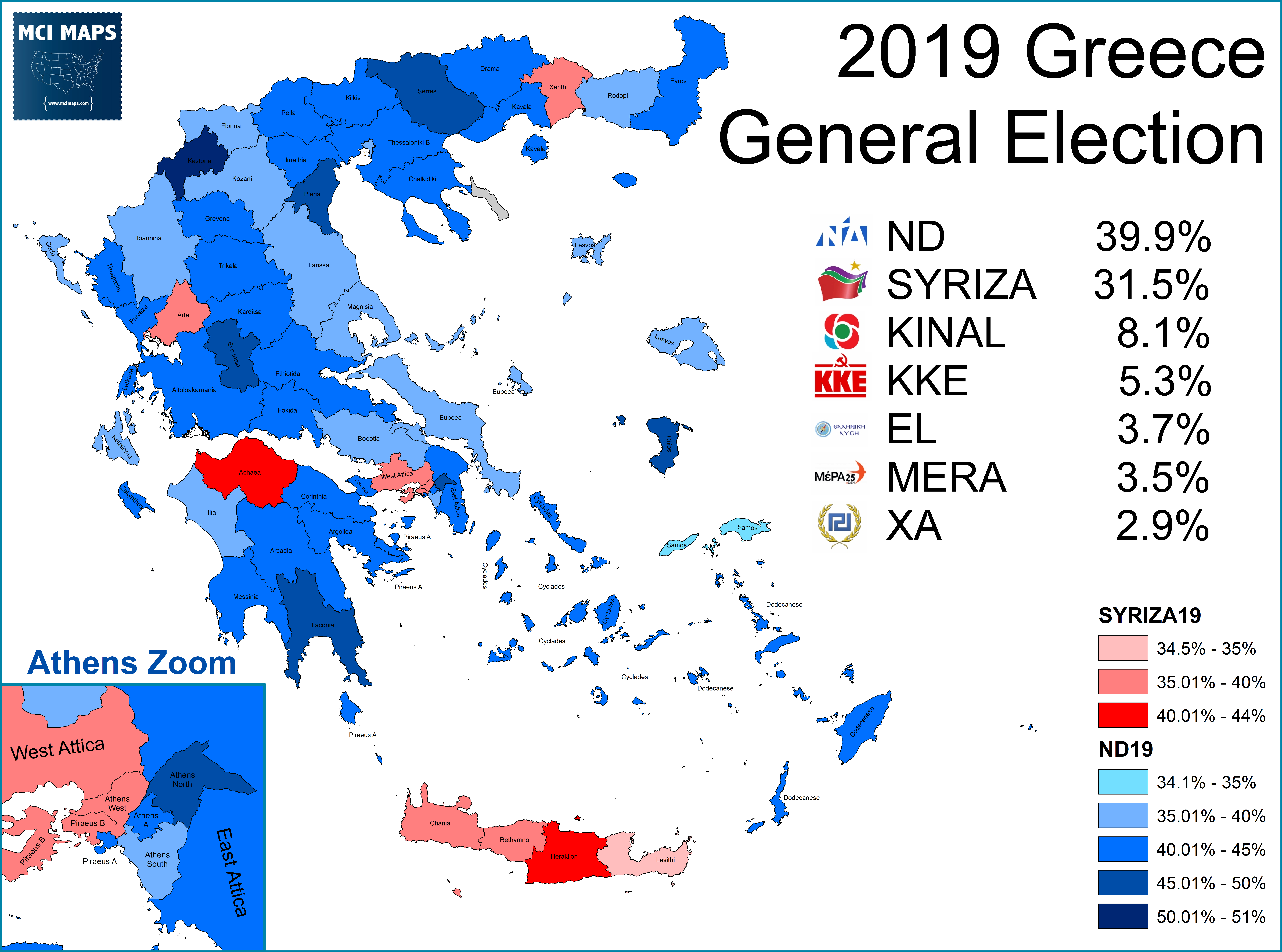
New Democracy won a solid 8 point win of SYRIZA and has enough seats to form a majority in the parliament. Some other important notes are that PASOK formally reformed as KINAL, continuing as a center-left party. Golden Dawn also fell to 3%, a modern testament to how fascist party fortunes are heavily tied to economic conditions. They actually fell below the 3% threshold needed to enter parliament.
If we break down the results by left vs right; then we see left-wing parties actually outpaced the right. SYRIZA actually saw two parties form as breakaways from them. MERA and PLEFSI are far-left parties that opposed the austerity measures SYRIZA backed.
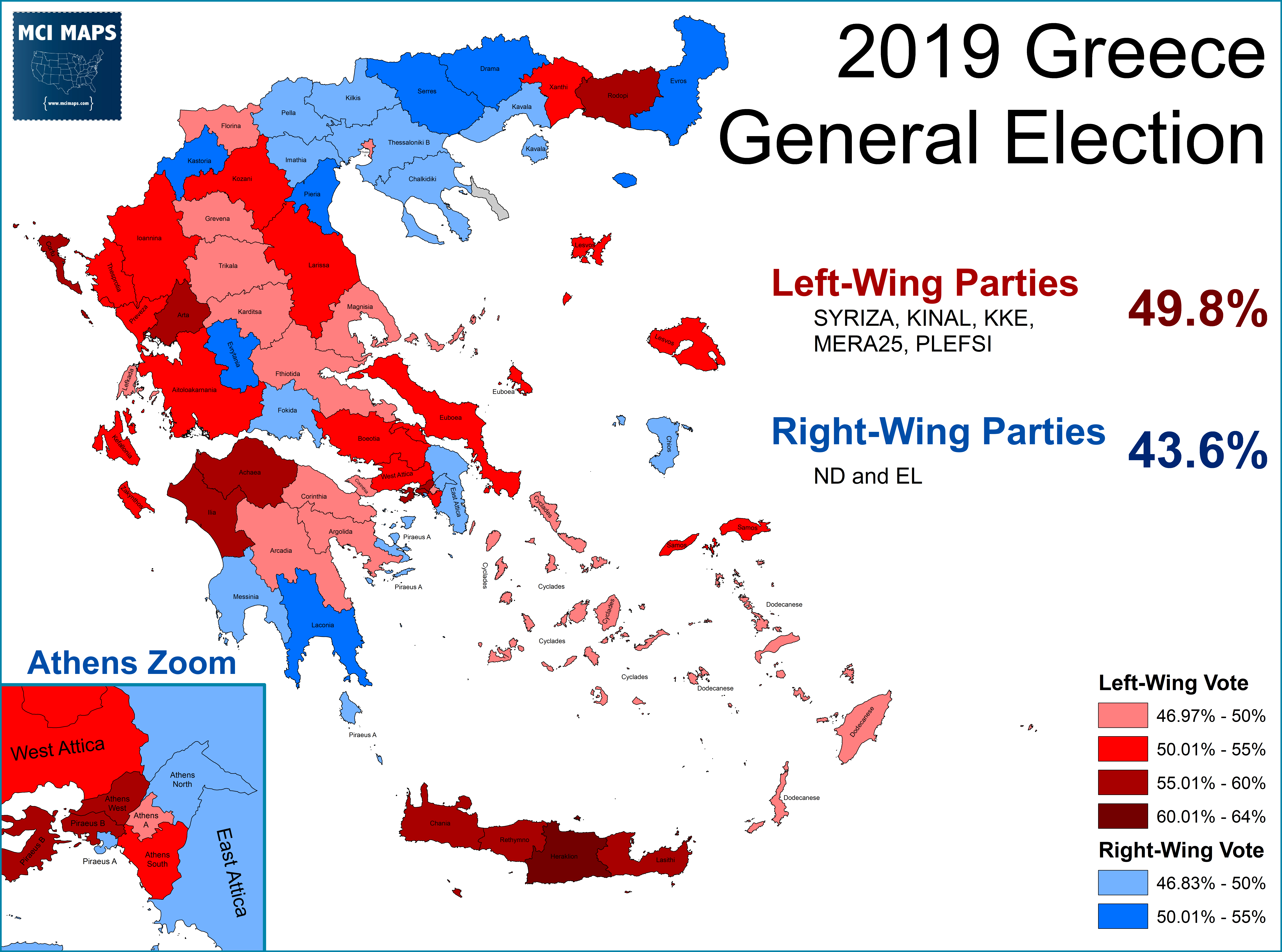
MERA and Plefsi made up 5% of the vote, not enough to make up the gap between SYRIZA and ND, but enough to be notable. The heads of these parties both used to be allies of Tsipras. MERA made the 3% threshold to earn seats in parliament.
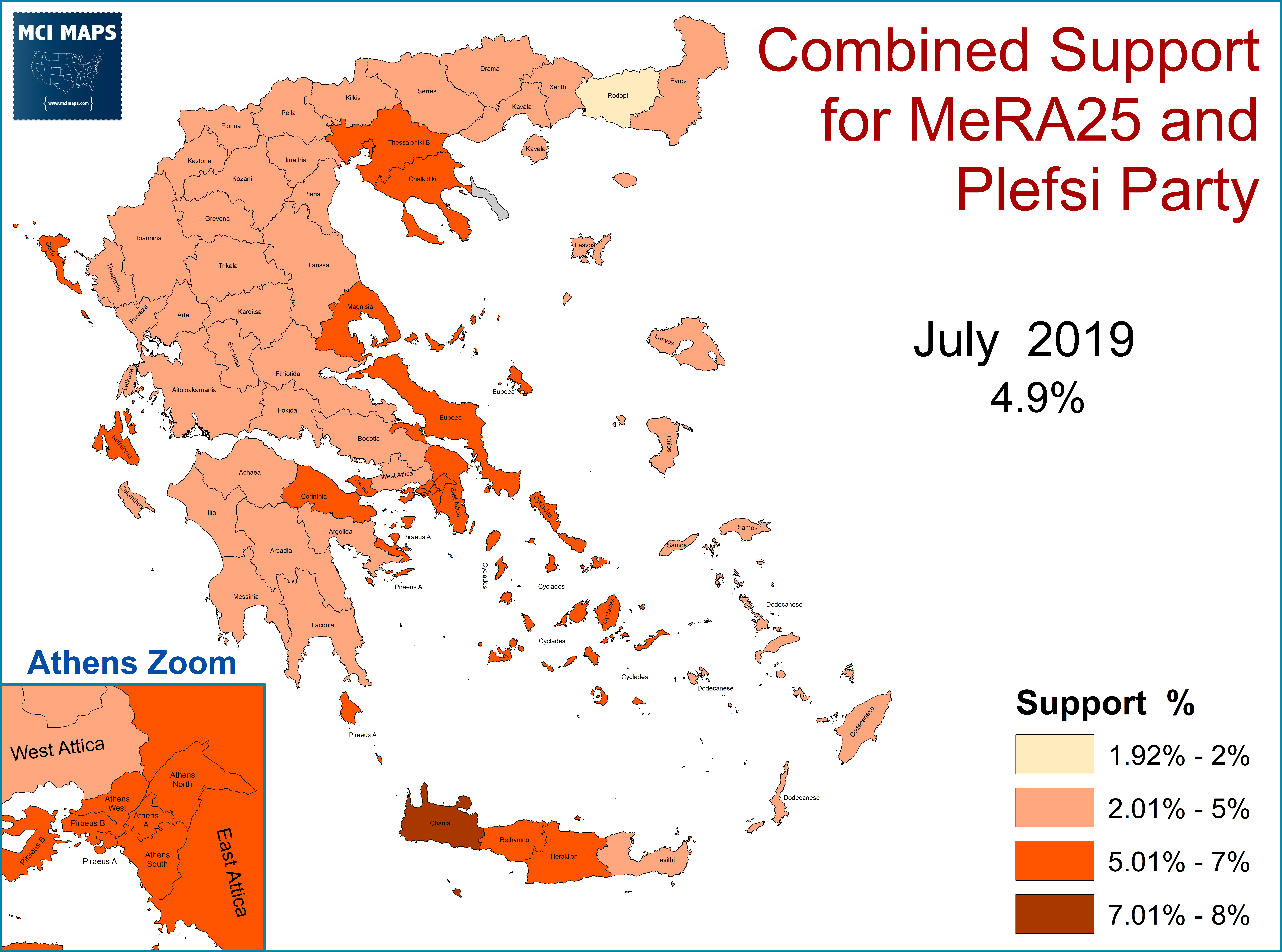
Of course, Greek party politics are not as simple as left vs right. Different coalitions have formed. However, to make some sense of which side gained or lost, the table below breaks down the recent biggest parties, by general ideology, and shows how their vote shifted since 2015.
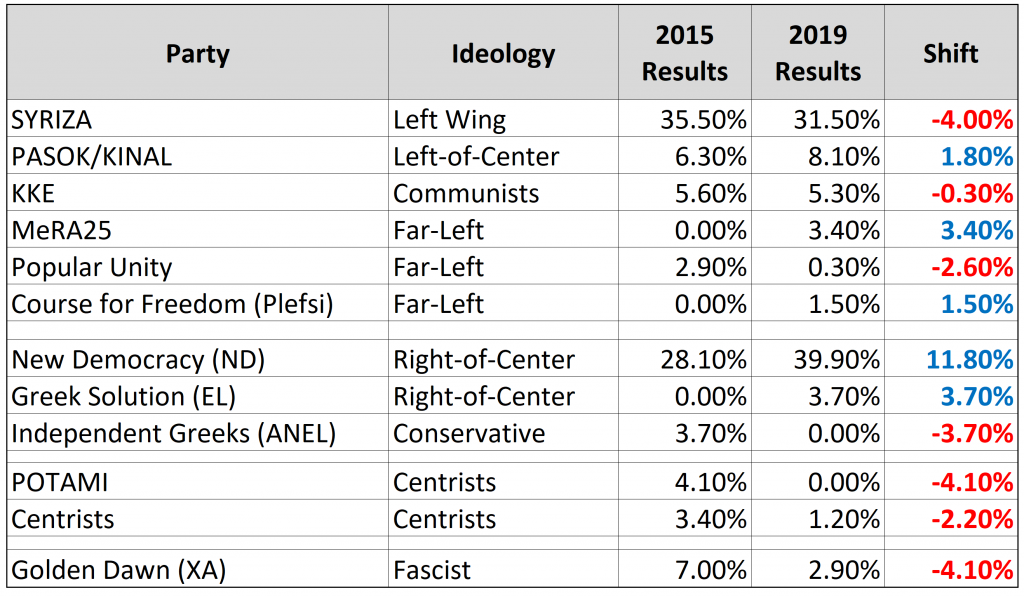
One thing to note is, ND gained much more than SYRIZA lost.
The New Party System
To me, the key takeaway from Greece’s elections is that ND vs SYRIZA is the new party system. ND maintains its right-of-center identity, but SYRIZA has transformed from far-left to left-of-center. They have effectively replaced PASOK in the main left-wing party role.
The line graph below, showing party support since 1977, shows how quickly PASOK/KINAL collapsed and SYRIZA rose to take its place.
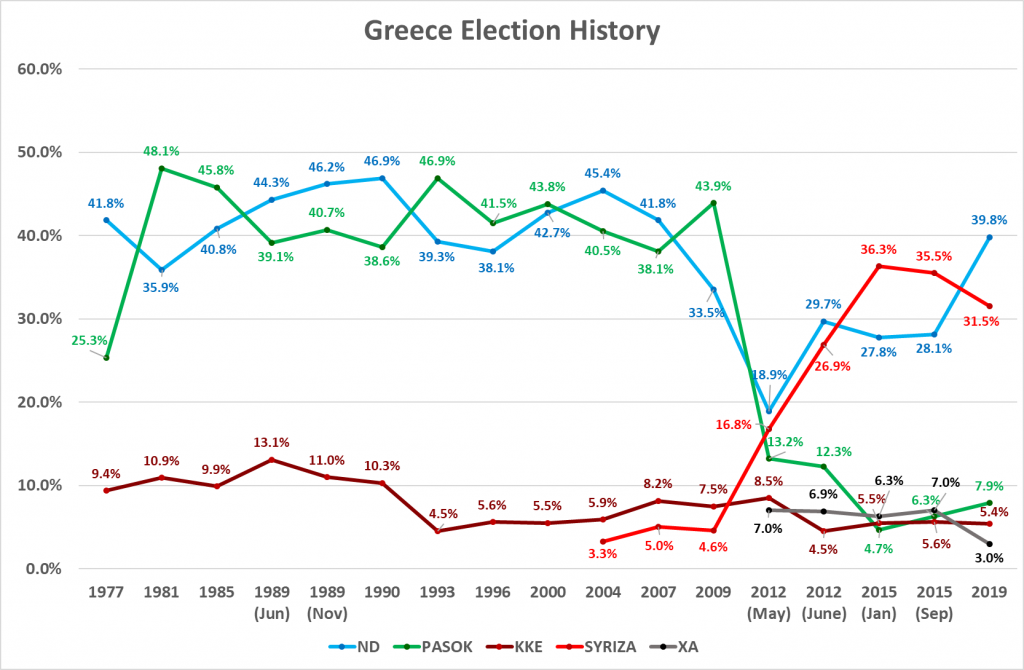
There is no reason, at the moment at least, to think this new dynamic will change. For SYRIZA the question will be if KINAL continues to hover around, and what gains the far-left offshoots make.
The worst of the crisis may be over in Greece, but the country is still economically recovering. We will see how Greek politics shake out of the next few elections. However, at the moment it appears Greek left seem content to stick with SYRIZA and keep PASOK/KINAL the past.

